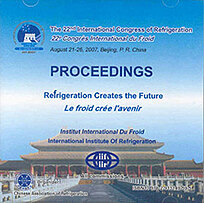
Document IIF
Influences des effets de l'eau accumulée, de la dispersion thermique et des conditions non adiabatiques sur la performance d'un régénérateur magnétique actif.
Influences of the stored water effect, thermal dispersion effect, and non-adiabatic condition on the performance of an active magnetic regenerator.
Auteurs : GAO Q., YU B. F., YANG D. X., et al.
Résumé
Active magnetic regenerator, AMR, is a key component in the room temperature magnetic refrigerator, whose performance prediction is significant to the optimum design of the magnetic refrigeration system. In this paper, the heat transfer theory of porous media is incorporated in the basic model of AMR, and a relatively complete model of AMR is developed. The new terms added are analyzed quantitatively. The simulation results indicate that the effect of stored water has a great influence on the temperature of AMR. The effect of stored water may decrease the changing rate of the temperature and arouse a shift of the flow rate with maximal capacity. Combined the effect of heat transfer between the solid and the fluid phase, about 75% degradation of the temperature change happened during the magnetization process. Furthermore, the existence of the thermal dispersion could result in a tiny decrease of the refrigeration capacity.
Documents disponibles
Format PDF
Pages : ICR07-B2-134
Disponible
Prix public
20 €
Prix membre*
Gratuit
* meilleur tarif applicable selon le type d'adhésion (voir le détail des avantages des adhésions individuelles et collectives)
Détails
- Titre original : Influences of the stored water effect, thermal dispersion effect, and non-adiabatic condition on the performance of an active magnetic regenerator.
- Identifiant de la fiche : 2008-0205
- Langues : Anglais
- Source : ICR 2007. Refrigeration Creates the Future. Proceedings of the 22nd IIR International Congress of Refrigeration.
- Date d'édition : 21/08/2007
Liens
Voir d'autres communications du même compte rendu (839)
Voir le compte rendu de la conférence
Indexation
-
Thèmes :
Froid calorique (froid magnétocalorique, électrocalorique, élastocalorique et barocalorique);
Autres systèmes de production de froid (dessiccation, thermoélectricité, thermoacoustique...) - Mots-clés : Réfrigerateur magnétique; Transfert de chaleur; Simulation; Modélisation; Milieu poreux; Matériau; Magnétisme
-
A practical model for performance analysis of a...
- Auteurs : ZHENG Z. G., YU H. Y., ZHONG X. C., et al.
- Date : 11/05/2009
- Langues : Anglais
- Source : 3rd International Conference on Magnetic Refrigeration at Room Temperature
- Formats : PDF
Voir la fiche
-
Dimensionless numerical model for determination...
- Auteurs : SARLAH A., POREDOS A.
- Date : 11/04/2007
- Langues : Anglais
- Source : 2nd International Conference on Magnetic Refrigeration at Room Temperature
- Formats : PDF
Voir la fiche
-
Optimization of active magnetic regenerative re...
- Auteurs : ROUDAUT J., BOUCHEKARA H., KEDOUS-LEBOUC A., et al.
- Date : 11/05/2009
- Langues : Anglais
- Source : 3rd International Conference on Magnetic Refrigeration at Room Temperature
- Formats : PDF
Voir la fiche
-
Numerical analysis of a reciprocative active ma...
- Auteurs : OLIVEIRA P. A., TREVIZOLI P. V., BARBOSA J. R. Jr, et al.
- Date : 11/05/2009
- Langues : Anglais
- Source : 3rd International Conference on Magnetic Refrigeration at Room Temperature
- Formats : PDF
Voir la fiche
-
Apparatus and method to determine convective he...
- Auteurs : SCHOPFER S., TURA A., et al., ARNOLD D.
- Date : 11/05/2009
- Langues : Anglais
- Source : 3rd International Conference on Magnetic Refrigeration at Room Temperature
- Formats : PDF
Voir la fiche
